Huimeng Wang
MOPSA: Mixture of Prompt-Experts Based Speaker Adaptation for Elderly Speech Recognition
May 30, 2025



Abstract:This paper proposes a novel Mixture of Prompt-Experts based Speaker Adaptation approach (MOPSA) for elderly speech recognition. It allows zero-shot, real-time adaptation to unseen speakers, and leverages domain knowledge tailored to elderly speakers. Top-K most distinctive speaker prompt clusters derived using K-means serve as experts. A router network is trained to dynamically combine clustered prompt-experts. Acoustic and language level variability among elderly speakers are modelled using separate encoder and decoder prompts for Whisper. Experiments on the English DementiaBank Pitt and Cantonese JCCOCC MoCA elderly speech datasets suggest that online MOPSA adaptation outperforms the speaker-independent (SI) model by statistically significant word error rate (WER) or character error rate (CER) reductions of 0.86% and 1.47% absolute (4.21% and 5.40% relative). Real-time factor (RTF) speed-up ratios of up to 16.12 times are obtained over offline batch-mode adaptation.
Towards LLM-Empowered Fine-Grained Speech Descriptors for Explainable Emotion Recognition
May 29, 2025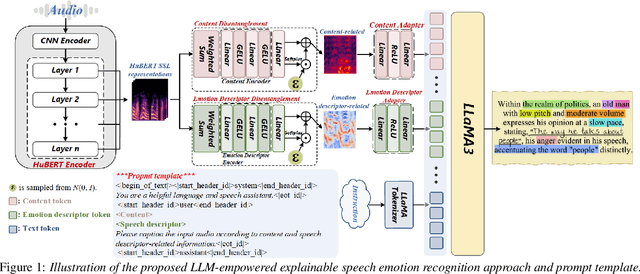
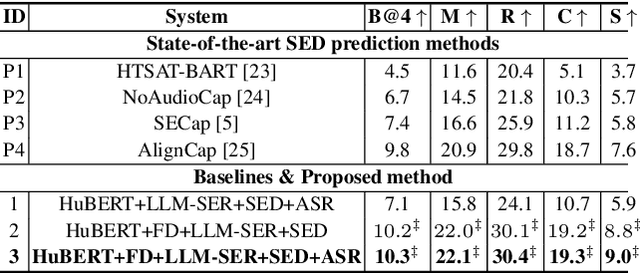
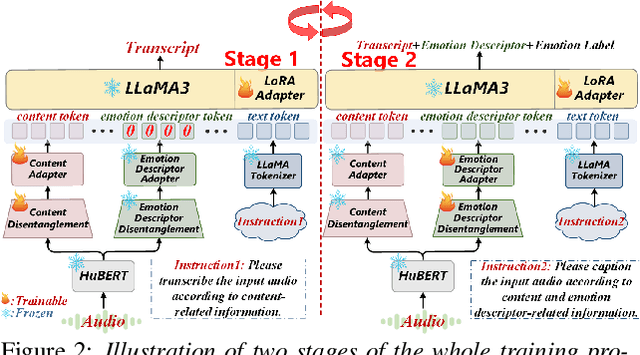
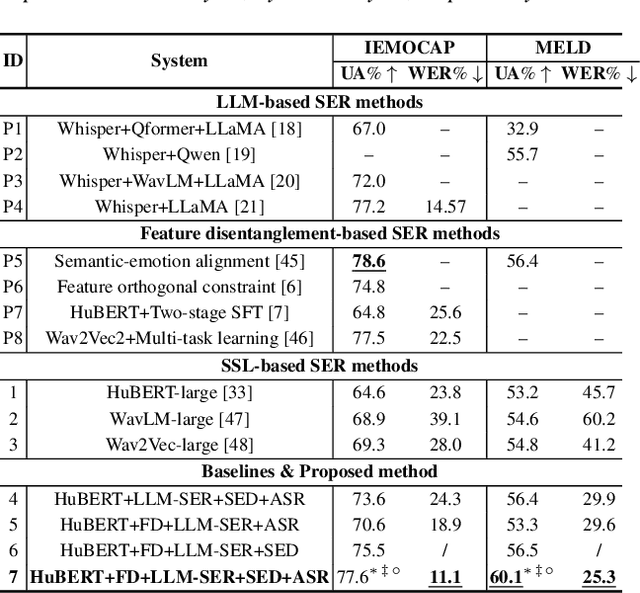
Abstract:This paper presents a novel end-to-end LLM-empowered explainable speech emotion recognition (SER) approach. Fine-grained speech emotion descriptor (SED) features, e.g., pitch, tone and emphasis, are disentangled from HuBERT SSL representations via alternating LLM fine-tuning to joint SER-SED prediction and ASR tasks. VAE compressed HuBERT features derived via Information Bottleneck (IB) are used to adjust feature granularity. Experiments on the IEMOCAP and MELD benchmarks demonstrate that our approach consistently outperforms comparable LLaMA-based SER baselines, including those using either (a) alternating multi-task fine-tuning alone or (b) feature disentanglement only. Statistically significant increase of SER unweighted accuracy by up to 4.0% and 3.7% absolute (5.4% and 6.6% relative) are obtained. More importantly, emotion descriptors offer further explainability for SER.
On-the-fly Routing for Zero-shot MoE Speaker Adaptation of Speech Foundation Models for Dysarthric Speech Recognition
May 28, 2025



Abstract:This paper proposes a novel MoE-based speaker adaptation framework for foundation models based dysarthric speech recognition. This approach enables zero-shot adaptation and real-time processing while incorporating domain knowledge. Speech impairment severity and gender conditioned adapter experts are dynamically combined using on-the-fly predicted speaker-dependent routing parameters. KL-divergence is used to further enforce diversity among experts and their generalization to unseen speakers. Experimental results on the UASpeech corpus suggest that on-the-fly MoE-based adaptation produces statistically significant WER reductions of up to 1.34% absolute (6.36% relative) over the unadapted baseline HuBERT/WavLM models. Consistent WER reductions of up to 2.55% absolute (11.44% relative) and RTF speedups of up to 7 times are obtained over batch-mode adaptation across varying speaker-level data quantities. The lowest published WER of 16.35% (46.77% on very low intelligibility) is obtained.
Effective and Efficient One-pass Compression of Speech Foundation Models Using Sparsity-aware Self-pinching Gates
May 28, 2025
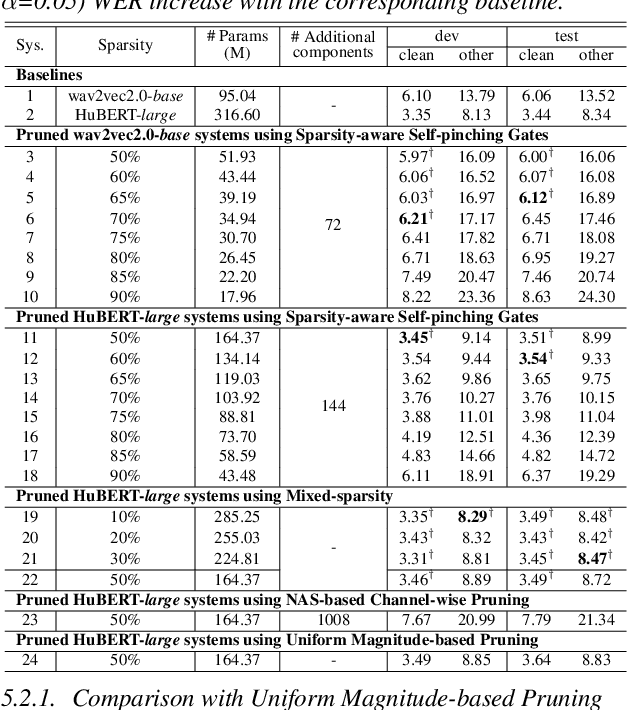
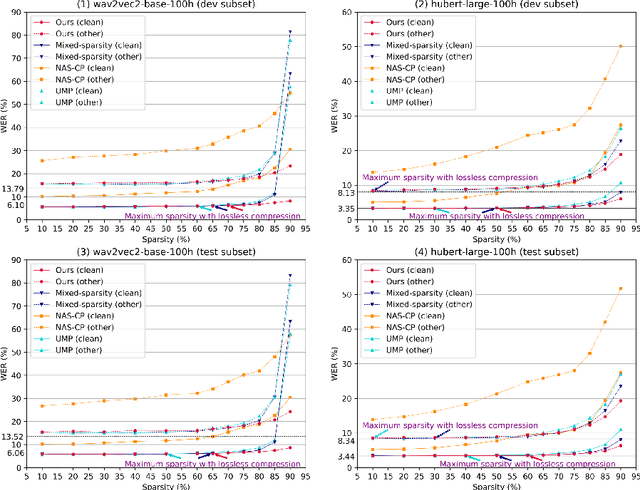
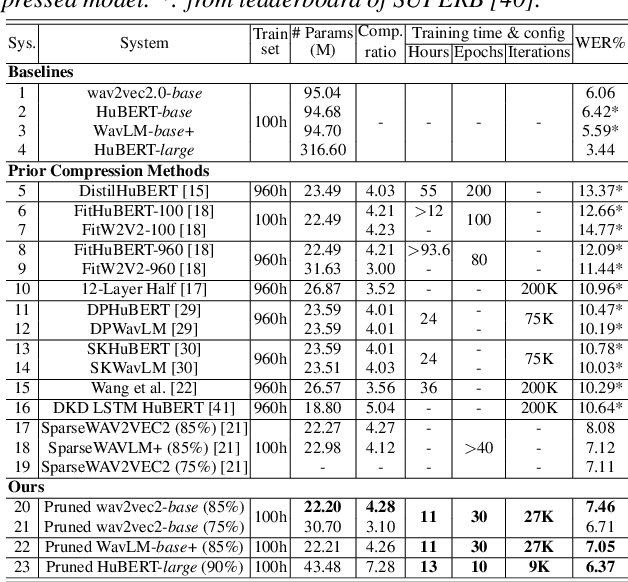
Abstract:This paper presents a novel approach for speech foundation models compression that tightly integrates model pruning and parameter update into a single stage. Highly compact layer-level tied self-pinching gates each containing only a single learnable threshold are jointly trained with uncompressed models and used in fine-grained neuron level pruning. Experiments conducted on the LibriSpeech-100hr corpus suggest that our approach reduces the number of parameters of wav2vec2.0-base and HuBERT-large models by 65% and 60% respectively, while incurring no statistically significant word error rate (WER) increase on the test-clean dataset. Compared to previously published methods on the same task, our approach not only achieves the lowest WER of 7.05% on the test-clean dataset under a comparable model compression ratio of 4.26x, but also operates with at least 25% less model compression time.
Towards One-bit ASR: Extremely Low-bit Conformer Quantization Using Co-training and Stochastic Precision
May 27, 2025Abstract:Model compression has become an emerging need as the sizes of modern speech systems rapidly increase. In this paper, we study model weight quantization, which directly reduces the memory footprint to accommodate computationally resource-constrained applications. We propose novel approaches to perform extremely low-bit (i.e., 2-bit and 1-bit) quantization of Conformer automatic speech recognition systems using multiple precision model co-training, stochastic precision, and tensor-wise learnable scaling factors to alleviate quantization incurred performance loss. The proposed methods can achieve performance-lossless 2-bit and 1-bit quantization of Conformer ASR systems trained with the 300-hr Switchboard and 960-hr LibriSpeech corpus. Maximum overall performance-lossless compression ratios of 16.2 and 16.6 times are achieved without a statistically significant increase in the word error rate (WER) over the full precision baseline systems, respectively.
Phone-purity Guided Discrete Tokens for Dysarthric Speech Recognition
Jan 08, 2025



Abstract:Discrete tokens extracted provide efficient and domain adaptable speech features. Their application to disordered speech that exhibits articulation imprecision and large mismatch against normal voice remains unexplored. To improve their phonetic discrimination that is weakened during unsupervised K-means or vector quantization of continuous features, this paper proposes novel phone-purity guided (PPG) discrete tokens for dysarthric speech recognition. Phonetic label supervision is used to regularize maximum likelihood and reconstruction error costs used in standard K-means and VAE-VQ based discrete token extraction. Experiments conducted on the UASpeech corpus suggest that the proposed PPG discrete token features extracted from HuBERT consistently outperform hybrid TDNN and End-to-End (E2E) Conformer systems using non-PPG based K-means or VAE-VQ tokens across varying codebook sizes by statistically significant word error rate (WER) reductions up to 0.99\% and 1.77\% absolute (3.21\% and 4.82\% relative) respectively on the UASpeech test set of 16 dysarthric speakers. The lowest WER of 23.25\% was obtained by combining systems using different token features. Consistent improvements on the phone purity metric were also achieved. T-SNE visualization further demonstrates sharper decision boundaries were produced between K-means/VAE-VQ clusters after introducing phone-purity guidance.
Effective and Efficient Mixed Precision Quantization of Speech Foundation Models
Jan 07, 2025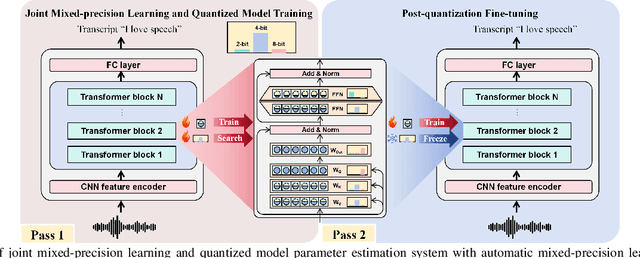
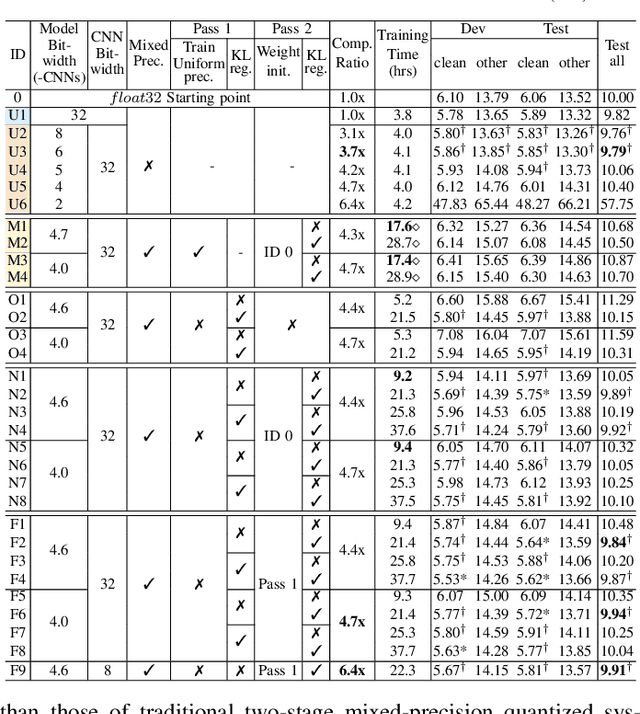
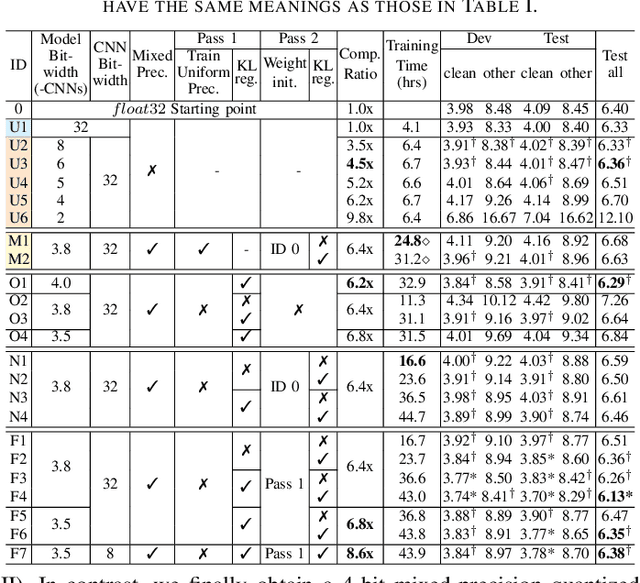
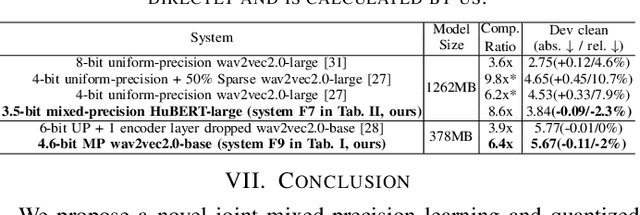
Abstract:This paper presents a novel mixed-precision quantization approach for speech foundation models that tightly integrates mixed-precision learning and quantized model parameter estimation into one single model compression stage. Experiments conducted on LibriSpeech dataset with fine-tuned wav2vec2.0-base and HuBERT-large models suggest the resulting mixed-precision quantized models increased the lossless compression ratio by factors up to 1.7x and 1.9x over the respective uniform-precision and two-stage mixed-precision quantized baselines that perform precision learning and model parameters quantization in separate and disjointed stages, while incurring no statistically word error rate (WER) increase over the 32-bit full-precision models. The system compression time of wav2vec2.0-base and HuBERT-large models is reduced by up to 1.9 and 1.5 times over the two-stage mixed-precision baselines, while both produce lower WERs. The best-performing 3.5-bit mixed-precision quantized HuBERT-large model produces a lossless compression ratio of 8.6x over the 32-bit full-precision system.
Exploring SSL Discrete Tokens for Multilingual ASR
Sep 13, 2024



Abstract:With the advancement of Self-supervised Learning (SSL) in speech-related tasks, there has been growing interest in utilizing discrete tokens generated by SSL for automatic speech recognition (ASR), as they offer faster processing techniques. However, previous studies primarily focused on multilingual ASR with Fbank features or English ASR with discrete tokens, leaving a gap in adapting discrete tokens for multilingual ASR scenarios. This study presents a comprehensive comparison of discrete tokens generated by various leading SSL models across multiple language domains. We aim to explore the performance and efficiency of speech discrete tokens across multiple language domains for both monolingual and multilingual ASR scenarios. Experimental results demonstrate that discrete tokens achieve comparable results against systems trained on Fbank features in ASR tasks across seven language domains with an average word error rate (WER) reduction of 0.31% and 1.76% absolute (2.80% and 15.70% relative) on dev and test sets respectively, with particularly WER reduction of 6.82% absolute (41.48% relative) on the Polish test set.
Enhancing Pre-trained ASR System Fine-tuning for Dysarthric Speech Recognition using Adversarial Data Augmentation
Jan 01, 2024


Abstract:Automatic recognition of dysarthric speech remains a highly challenging task to date. Neuro-motor conditions and co-occurring physical disabilities create difficulty in large-scale data collection for ASR system development. Adapting SSL pre-trained ASR models to limited dysarthric speech via data-intensive parameter fine-tuning leads to poor generalization. To this end, this paper presents an extensive comparative study of various data augmentation approaches to improve the robustness of pre-trained ASR model fine-tuning to dysarthric speech. These include: a) conventional speaker-independent perturbation of impaired speech; b) speaker-dependent speed perturbation, or GAN-based adversarial perturbation of normal, control speech based on their time alignment against parallel dysarthric speech; c) novel Spectral basis GAN-based adversarial data augmentation operating on non-parallel data. Experiments conducted on the UASpeech corpus suggest GAN-based data augmentation consistently outperforms fine-tuned Wav2vec2.0 and HuBERT models using no data augmentation and speed perturbation across different data expansion operating points by statistically significant word error rate (WER) reductions up to 2.01% and 0.96% absolute (9.03% and 4.63% relative) respectively on the UASpeech test set of 16 dysarthric speakers. After cross-system outputs rescoring, the best system produced the lowest published WER of 16.53% (46.47% on very low intelligibility) on UASpeech.
 Add to Chrome
Add to Chrome Add to Firefox
Add to Firefox Add to Edge
Add to Edge